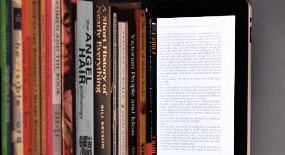It is worrying for booklovers that the smell and touch of a musty old novel and the look of its spine on your bedroom shelf may be sensations that will dwindle into memory. As a book lover with a ploddingly increasing personal library I find myself automatically averse to Amazon’s Kindle.
However, over the past months, it has raced ahead of physical book sales which are now believed to be at the record low for almost a decade.
It seems Kingston’s big bookshops, such as the Bentall’s Centre Waterstones, are similar to other high street stores that are feeling the latest pressures of the economic downturn and high rents.
Their future remains uncertain.
Nationally, in this year’s January sales, the number of novels sold around the U.K fell by around 25% compared to 2011.
According to a recent article by James Hall, the Daily Telegraph’s Consumers Affairs Editor, “Sales of printed novels over the first four weeks of 2012 fell by over a million copies compared to the same month a year ago”.
With Kingston stores such as W.H.Smiths offering Kindles for budget prices it is unsurprising that they are muscling in so noticeably on the book market.
The store charges between £69.99 for the Kobo Wireless eReader and £149.99 for the more advanced Vox Colour eReader.
“They are the new thing to have” said Natalie Mileto, of Kingston’s W.H.Smiths, “People find them easier to travel with like to switch between several books at once”.
According to a recent survey conducted by ‘YouGov’ of the 1.3 million e-readers brought over Christmas, ninety two percent where kindles.
This means that one in forty adults in the United Kingdom received a Kindle this year from Father Christmas.
However it’s not all doom and gloom for Kingston book lovers; some bookstores remain profitable and their staff optimistic about the future of the book selling industry.
CLC Bookshop, next to Kingston’s Bentalls Centre, enjoyed a profitable Christmas season and sees no reason to fret about the technological take over.
Ann Lloyd, of Kingston’s CLC bookshop, says “We are aware of the importance of the Kindle, especially when shopping on the high street, but there is plenty of time to go before it overtakes. I think that hard books will last at least for this generation”.
Graham Lapthorn, also of CLC bookshops, adds “We also think that there is still a market for large bookstores, as there are still a lot of people who want a real book on their shelf. One of our colleagues has a kindle, but if he really likes the book he will buy a hard copy”.
This begs the question: does the medium matter so long as young people and wide audiences continue to read?
Anna Faherty, a lecturer at Kingston University’s publishing department, says “Publishers want people to be able to access, use (and hopefully pay for) their content. Print is not the only way to do this. People have been accessing and reading journals articles or referencing resources online for many years”.
“One potential hurdle for ebooks is that they incur VAT whilst physical books do not” she adds.
So are physical books a thing of the past?
“There are plenty of benefits of ebooks for both readers and publishers. Consumers can get books anytime, anyplace and they can try out a chapter before they buy (which might mean they are more experimental in their reading). Publishers are saved the cost of printing, storing and distributing physical books – but note that they will probably pay higher royalties to authors, so this saving doesn’t necessarily translate into a lower cover price”.





